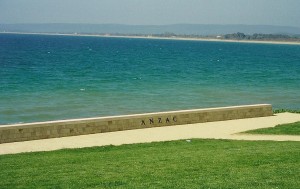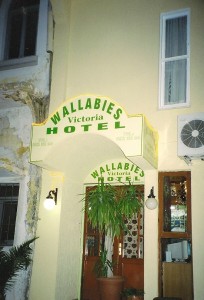It’s ANZAC Day. This is the day when we in Australia and New Zealand commemorate those fallen in war. It hardly seems a year since I joined a fellow ANZAC compatriot, my kiwi mate Rusty at the memorial at Marble Arch, London. There is something very patriotic about joining with your tribe in a foreign land. It makes you feel even more stoic and proud. Now back home, like most in Australia I will attend a dawn service and watch the big parade through the streets of Sydney. The rest of the day will probably be spent playing the coin game “Two Up’ (see end note). It is illegal to play it at any other time but ANZAC Day when everyone goes to their local RSL (Returned Servicemen’s League) Club, has a pint and gets involved.
 On the other side of the globe, the big crowds of primarily young antipodeans will make the annual pilgrimage to Gallipoli in Turkey where ANZAC was born. Nearly 100 years on, it seems strange that such a young population would bother acknowledging a war that really had nothing to do with their country and took place on the other side of the world. However for some in the land Down Under, ANZAC Day has more meaning than Australia Day. The word ANZAC is synonymous with “Aussie spirit” in the southern vernacular. The acronym stands for Australia and New Zealand Army Corps and was first used during World War 1. We were still a young country during The Great War and it marked the time when we grew up; our initiation into adulthood. It is what defined us and brought out what we were as a nation; the birth of the Aussie Spirit.
On the other side of the globe, the big crowds of primarily young antipodeans will make the annual pilgrimage to Gallipoli in Turkey where ANZAC was born. Nearly 100 years on, it seems strange that such a young population would bother acknowledging a war that really had nothing to do with their country and took place on the other side of the world. However for some in the land Down Under, ANZAC Day has more meaning than Australia Day. The word ANZAC is synonymous with “Aussie spirit” in the southern vernacular. The acronym stands for Australia and New Zealand Army Corps and was first used during World War 1. We were still a young country during The Great War and it marked the time when we grew up; our initiation into adulthood. It is what defined us and brought out what we were as a nation; the birth of the Aussie Spirit.
In 1915, our troops were to land on the northwestern Turkish coast to take control of the Dardanelles, a narrow strait of water. A strategic move, it didn’t go quite to plan. Accidentally deposited by British commanders in the wrong spot, the ANZAC diggers faced vertical cliffs to scour rather than the sandy beaches that were the target. Only about 1.5km of land was taken in the whole operation, but no frontline had been harder fought for. The slaughter would not deter the larrikin spirit or the obsessive drive forward; never give up no matter what.
I’ve made my pilgrimage to the site in Gallipoli, though during quieter times. The battle field is an eerie place and has a feeling of sacredness surrounding it. The ANZAC spirit wells up inside and I defy any Aussie or Kiwi not to get a tear in the eye when, for the first time, they lay eyes on the solitary bronze lettering ANZAC on the low sandstone wall against the cove. It is truly moving. Lone Pine, The Neck, Suvla Bay, the names from the history book are right there in front of you. But it is easy to forget that this is a special place for the Turkish people as well. Sometimes we are guilty of seeing Gallipoli as just an Australian and New Zealand event. Many Turks died here. They too were a country who unwillingly became involved in a war that wasn’t theirs to fight. This has brought three very different countries very, very close. No matter where you are in Turkey, once a local finds out that you are an Australian or a New Zealander, instead of viewing you with scorn over past events, you are welcomed with open arms. There is a real brotherhood, a recognition and mutual respect of what the other went through; almost an honor. It says a lot about the human spirit. Even in towns nowhere near Gallipoli there will be Canberra Hotel or All Blacks Bar and it’s no surprise if someone buys you a beer or two
There is a huge sandstone monument at the entrance to ANZAC Cove which has on it an inscription written by the Turkish leader Ataturk in 1934. It perfectly states the feelings between the foreign countries. It is a shame we need the brutality of war to bring out such brotherhood. I will leave you with its words:
Those heroes that shed their blood and lost their lives… You are now lying in the soil of a friendly country. Therefore rest in peace. There is no difference between the Johnnies and the Mehmets to us where they lie side by side now here in this country of ours… you, the mothers, who sent their sons from faraway countries wipe away your tears; your sons are now lying in our bosom and are in peace. After having lost their lives on this land. They have become our sons as well.
Side Note: Two Up……”Come in spinner!”
This is an old Australian gambling game. It is only legal to play on ANZAC Day when the whole nation gets involved by going to their local pub or club to celebrate what was a favourite pastime of the diggers (Australian soldiers) back in World War 1.
It involves two pennies being placed on a piece of wood (kip) and being thrown in the air by the Spinner. Bets are placed with the Boxer as to whether the coins will land both heads up, both tails up or one of each (odds). It is usually played over an old rug thrown on the floor with players standing around in a circle. It is up to the Ringer that all play remains fair and under control.


